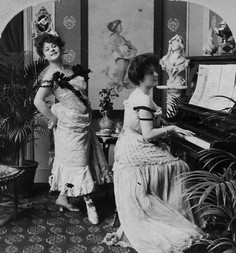
I have a beta reader story to share, but that’s for another post. Today, let’s talk about Victorian-era songs, shall we?
Before you doze off, let me tell you why this is a topic for discussion. Early on in the Fifth Bro’ writing process, Glynn looked up from his brand new and, therefore, endlessly-aggravating HP-bargain laptop, and asked, “Remember how you used to write songs?”
Once upon a time, that was true. I used to write many things for my own amusement, including songs, and poetry, and dark Lovecraftian tales. I didn’t try to sell these efforts, I never had an interest in publishing what I was writing, but I enjoyed the creative process immensely.
When Glynn was courting me, I even wrote a song about our relationship at the time. Frankly, it was mostly about him. I was smitten with the boy, to use a Victorian-era term, but you wouldn’t know it from the song’s lyrics. In the song, I made fun of my beau, his car, and the interesting, sometimes-terrible dates we’d shared to that moment.
When the song made him smile, I realized, This guy could be worth keeping. So I did.
But that was then and this was now. I hadn’t written an original song since…well, the last time Glynn asked the very same question. We know better than to use someone else’s lyrics in our work – here, if you wonder why – so I stepped up and did the job. But that was four years and a different novel ago. Even then, it wasn’t easy.
For that book, we needed a contemporary song. Since our current story is set in the 1870’s, a contemporary song was out of the question, and I’d only ever written contemporary songs. It was with a bit of trepidation that I told him, yes, I remembered how I used to write songs. I think I added, “Used to, used to, used to.”
“Good,” he told me, oblivious to my subtlety. “What do you think about adding a song to Fifth Brother?”
After we talked about it, I saw why a few lyrics might be a positive thing, so I went off to research Victorian-era songs. I did this with the happy confidence that written material published over 140 years ago was well out of copyright. We could publish as little, or as much, of those songs as we wanted. That way, I wouldn’t have to write any lyrics on my own.
I discovered songs like I’ll Take You Home Again, Kathleen – first heard years before the turn of the twentieth century, but recorded not so long ago by the likes of Elvis Presley and Johnny Cash. Home on the Range was a smash in 1873 and Onward, Christian Soldiers hit the charts in 1871. If they’re not familiar to you, you can find several versions on the ‘net. Many performers have done many, many versions of these songs.
I also came across songs that I’d never heard of, such as Come into the Garden, Maud (1857, a bit too early), Carve Dat Possum (1875) and Oh, Ain’t I Got the Blues (1871). With barely any investigation, I found that those tunes, too, are still being performed today. I was surprised. This presented a problem because, in our story, the heroine detests the song she hears. Hates it. She thinks it’s terrible and wishes she could slap the songwriter.
This gave us reason, copyright or no, not to use an existing song. It seems that, once written, they never go away. At any moment, some somebody is stepping up to the mic to perform an ancient tune. And we didn’t want a fan of Carve Dat Possum to blister our novella with one-star reviews when it hit the electronic racks.
Regardless of copyright issues, we needed to write a new, old song. I was feeling a little blocked until Glynn offered a song title that seemed in keeping with the times: Nelly, Don’t You Cry. I liked it. Feeling inspired, I had a version that pleased us both before the end of the day.
Since the pretend song’s words are best read in context of our forthcoming story, I won’t share the lyrics with you now. Instead, courtesy of Wikipedia, let me offer the words to one of the era’s immortal classics:
Carve dat possum, carve dat possum, children,
Carve dat possum, carve him to de heart;
Carve dat possum, carve dat possum, children,
Carve dat possum, carve him to de heart.
See you next week.

 RSS Feed
RSS Feed
